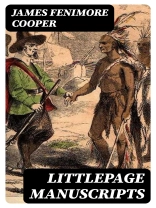In ‘Littlepage Manuscripts, ‘ James Fenimore Cooper intricately weaves a tapestry of early American life through the lens of fictional memoirs, presenting a narrative that juxtaposes realism with romantic ideals. The text unfolds as a series of stories penned by the characters, reflecting the tensions of social class, frontier life, and the encroaching modernity of America during Cooper’s time. His literary style, characterized by dense prose and rich symbolism, invites readers into a world where personal ambitions collide with collective identity, ultimately questioning the values that underlie the American experience. James Fenimore Cooper, a seminal figure in American literature, was profoundly influenced by his experiences in the burgeoning United States. Born into an aristocratic family in 1789, Cooper’s engagement with themes of democracy and individualism stemmed from his own identity as an early American citizen. His keen observations of societal changes, as well as his profound understanding of native cultures and colonial history, underscore the impetus for compiling the ‘Littlepage Manuscripts, ‘ emphasizing the complexities of heritage and self-discovery. This book is highly recommended for readers interested in the evolution of American literature and the foundational narratives that shaped national identity. It is a compelling exploration of the American spirit, a must-read for those seeking to understand the undercurrents of cultural dialogue that continue to resonate today.
Circa l’autore
James Fenimore Cooper (1789-1851) was a prolific and popular American writer of the early 19th century. His historical romances of frontier and Native American life in the young American republic created a unique form of American literature. He is best known for his Leatherstocking Tales, which includes ‘The Last of the Mohicans’, a narrative that has endured as one of the most popular novels in American literature. Additionally, Cooper’s ‘Littlepage Manuscripts’, a trilogy consisting of ‘Satanstoe’, ‘The Chainbearer’, and ‘The Redskins’, offers readers insights into land issues and the anti-rent wars in New York during his time, painting a vivid picture of American life and social structures. His works expressed his deep fascination with the wilderness, westward expansion, and the plight of Native Americans during the period of rapid territorial growth. Cooper’s literary style was heavily influenced by the Romantic movement, focusing on adventure and nature, which allowed him to create complex characters and explore profound themes such as individuality, freedom, and society. His contribution to literature was recognized by his contemporaries and continues to be studied for its historical context and narrative innovations.












